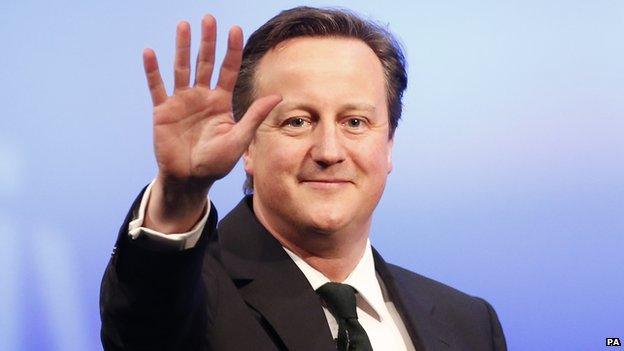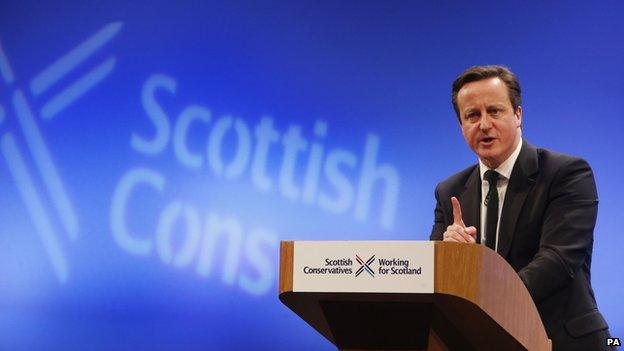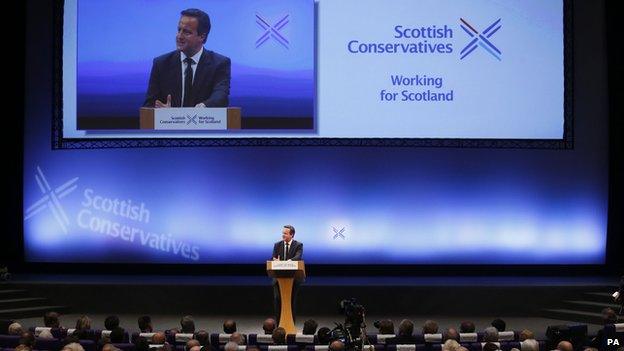A firm offer from Cameron?
- Published

David Cameron made the Scottish electorate a 'conditional' offer on more tax powers for Holyrood
From David Cameron, then, an offer of more tax powers for the Scottish Parliament within the United Kingdom. An offer which is designed to resonate in the referendum debate - but which was also aimed at representatives in the hall for the Scottish Conservatives conference.
The prime minister went further than before in endorsing the enhancement of devolution. Quite deliberately, he described himself as agreeing with the party's Scottish leader Ruth Davidson.
Why? Two reasons. One, to underline her status. Two, to pre-empt any grumbling from the elegantly mown grass roots of the Tories about going further down a devolutionary path which they didn't much fancy in the first place. It is no coincidence that their loudest applause was for any reference to "our United Kingdom."
Strictly speaking, his offer was couched in terms that might be viewed as conditional. He described the choice facing people at the referendum thus. "Vote 'Yes' - that is total separation. Vote 'No' - that can mean further devolution. More power to the Scottish people and their parliament, but with the crucial insurance policy that comes with being part of the UK."
The wicked media instantly pounced upon that word "can". (It's part of our charm.) We were assured, repeatedly, that the PM meant "will": that he intended this to be a certain offer.
So why say "can"? Why write "can" in the text? Apparently, one aide suggested, he had not wanted to seem presumptuous and rude. It sounded less blunt.
Conditions
I suppose there are two inherent elements of conditionality with regard to this issue. Firstly, the Tories still await the outcome of their commission, chaired by Lord Strathclyde, which is due to report its thinking on more powers in May.

The prime minister's speech at the Scottish Conservatives conference in Edinburgh was aimed at both voters and the party faithful
Secondly, this is a Tory offer - not a pan-Unionist offer. It is, therefore, conditional upon the election of a Conservative government at the UK general election next year.
To repeat, party strategists are adamant that this is a firm offer. They point to other phrases in the speech. "A vote for 'No' is not a vote for no change". And "we are committed to making devolution work better still."
And: "Giving the Scottish parliament greater responsibility for raising more of the money it spends. That's what Ruth believes - and I believe it too."
In her webcast interview with me, Ruth Davidson indicated her firm support for enhancing Holyrood's tax powers - with the intent of using that enhanced power to reduce taxation in Scotland. She also made clear that she has discussed such matters every step of the way with the prime minister.

Tory leader Cameron was careful to back the position of the party's Scottish chief, Ruth Davidson
In short, this is being choreographed. Ms Davidson anticipates that Strathclyde will back tax powers. If they do, she will say yes - confident in the knowledge that the PM is with her.
Scepticism
Next week we will learn Labour's offer on more powers for Holyrood. We already have the Liberal Democrat offer on the table.
In response, those advocating independence voice scepticism. Such offers, they say, cannot be trusted. They are driven, they say, by an attempt to counter and undermine the referendum debate.
Such voices point to the suggestion by Lord Lang in a newspaper interview that the issue of more powers might usefully be deferred until after the referendum. Blair Jenkins, chief executive of Yes Scotland, said this was plainly designed to consign the question to the long grass.
Back at the Tory conference in Edinburgh, there are representatives who would, frankly, welcome such a move. Ruth Davidson believes the party must outline its position before the referendum. So too, we are now assured, does the PM.